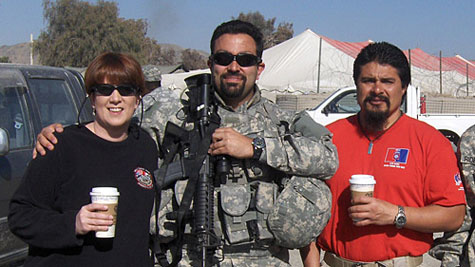
‘He thought he could do something good’ Michael (center) with members of the Human Terrain program.
|
Linda Bhatia gave her son’s Scout badges to his old pack and his 700 books to his alma mater, Brown University, but she will never let go of the things he had in his final days: his compass, the dimes in his pocket, his wallet, the watch he was probably wearing when a roadside bomb killed him in Afghanistan.
Two years have passed since the military sent back Michael’s possessions in a box, but it seems like yesterday. She misses him. And while she grieves, the academic world continues to argue over whether the 31-year-old scholar, not soldier, should have been in Afghanistan in the first place.
Dozens of stories have been written about Michael since his death and now there is a documentary, Human Terrain, which profiles the young man and also explores the simmering debate over a military program that assigns academics, like Michael, to combat units in the war against insurgents.
Winner of the Audience Award at Italy’s prestigious Festival dei Popoli, the film will be shown on May 29 at 4:15 pm at the Avon Cinema. A question-and-answer session will follow with the co-directors: James Der Derian, a professor at Brown’s Watson Institute for International Studies, and local filmmakers David and Michael Udris. Proceeds will go to the Michael Bhatia Memorial Fund at Brown.
The military’s Human Terrain System was created in 2006 after commanders realized that soldiers in Iraq and Afghanistan had no cultural knowledge of the battle zone. Under the program — which has so far deployed about 27 teams — scholars in military units interview villagers and tribal leaders and advise soldiers on local politics, economics, and tribal dynamics.
Supporters of the project contend that informed soldiers make better decisions, thus reducing the number of fatalities. They also say that social scientists can help identify people the soldiers can work with to improve the performance of local governments.
But many academics are highly critical of the plan, arguing that scholars are simply serving as intelligence gatherers, feeding information to the military. Critics also question whether professors should be exposed to such hostile places. The American Anthropological Association has come out strongly against the program, calling it unethical.
Linda, a pharmacist, says her son was fully aware of the debate when he signed up to work in Afghanistan. “He felt it was his responsibility to go,’’ she said, at her house in Medway, Massachusetts, where Michael grew up. “He thought he could do something good. He felt he had value.’’
Born August 23, 1976, Michael was a curious boy who liked to play with Legos and read adventure books. He was an avid Scout, achieving the rank of Eagle. In junior high school, he developed a passion for politics. By eighth grade, he knew what he wanted to study in college: international relations. He blossomed at Brown. “It was like an explosion,” said Linda. “You could see how worldly he was becoming.’’
After graduating in 1999, he did humanitarian and research work in East Timor and Kosovo and eventually landed at Oxford University to pursue his doctorate degree. During that time, he visited Afghanistan five times and fell in love with the country. “He said they were always welcoming,” said Linda. “He enjoyed wandering around. He wanted to absorb everything. He said they were just trying to survive after so many conflicts.”